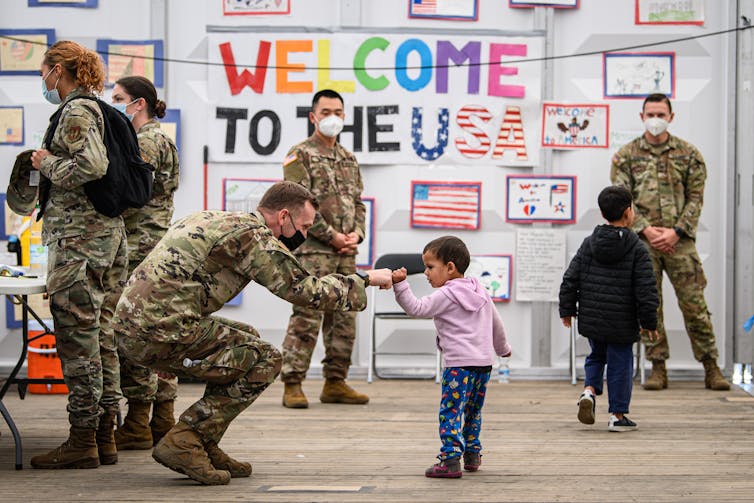
The U.S. has evacuated 84,600 Afghans since August 2021, but many of these people remain in a legal limbo. Master Sgt. Donald R. Allen/Air Force
Afghan Evacuees Lack a Clear Path for Resettlement in the U.S., 7 Months after Taliban Takeover
The U.S. has promised to take in 100,000 Ukrainian refugees. But there is concern that this could further complicate efforts to welcome and resettle Afghan evacuees.
Russia’s war against Ukraine has resulted in more than 4 million Ukrainian refugees fleeing the country.
The United States said on March 24, 2022, that it would welcome 100,000 Ukrainian refugees.
The Ukrainian refugee situation continues to overshadow another refugee crisis. That crisis stems from the U.S. military’s official withdrawal from Afghanistan in August 2021.
Since the withdrawal, approximately 84,600 Afghans were evacuated to the U.S.
It is estimated that thousands of Afghans vulnerable to the Taliban have been left behind.
“There are still Afghans being killed by the Taliban because we haven’t gotten them out of the country,” U.S. Congressman Seth Moulton said on March 28.
As a scholar of refugees and post-conflict reconstruction, I believe that the deteriorating situation in Afghanistan will continue to result in rising numbers of refugees in the years to come.

A hasty retreat
Prior to the U.S. military withdrawal, Afghanistan produced the second-largest number of refugees in the world, topping 2.6 million. The largest refugee crisis comes from 11 years of war in Syria.
Following the Soviet Union invasion in 1979, the majority of Afghan refugees have fled to Iran and Pakistan. Since then, ongoing civil war and violence as well as the U.S. invasion in 2001 prompted more people to seek refuge in these countries.
As humanitarian needs in Afghanistan now grow, Afghans continue to cross into these countries.
The U.S. evacuation of Afghan refugees in 2021 was the largest evacuation effort in U.S. history since the 1975 Operation New Life, when 110,000 Vietnamese refugees were evacuated to Guam after the fall of Saigon.
President Biden called the Afghan evacuations an “extraordinary success.”
But there was bipartisan condemnation in Congress of the hasty nature of the withdrawal and evacuations, which resulted in many Afghans and some American citizens being left behind.
Refugee system cuts
In September 2021, the White House requested Congress to authorize $6.4 billion and received $6.3 billion for Afghan resettlement.
But the nine U.S. refugee resettlement agencies designated to welcome and support refugee arrivals have still struggled to assist the large number of Afghans because of limited staff and continued funding shortages.
This is partially because during the Trump administration, there were severe cuts to the number of refugees allowed in to the U.S. President Donald Trump also cut budgets for refugee spending.
Afghan evacuees in the U.S. also continue to face legal and logistical challenges in their long-term resettlement process.
Difficult to stay in US
Typically, the U.S. admits foreigners like Afghans who might fear to return to their home countries as either refugees or, less often, asylum recipients. Both of these options allow non-citizens to legally work and live in the U.S., and to eventually gain citizenship.
For Afghan evacuees, the legal pathways to stay permanently in the U.S. are complicated.
Some of the recent Afghan evacuees are recipients of special immigrant visas. These visas have gone to those who worked closely with the U.S. military in Afghanistan, and give benefits like work permits and a clear pathway to becoming citizens.
The majority of the evacuees, however, received humanitarian parole - a temporary status given for emergency humanitarian situations. This is valid for up to two years.
On March 16, 2022, the Biden administration also announced that Afghans already living in the U.S. would receive Temporary Protected Status. This gives Afghans legal work permits, but only lasts for 18 months.
The Department of Homeland Security estimates 74,500 Afghan nationals could be eligible for this status.
Some Afghan resettlement advocates are pushing for Congress to pass legislation that would allow certain Afghan evacuees to apply for permanent legal status in the U.S.

Desperate Afghans outside the U.S.
Back in Afghanistan, the Taliban’s takeover has prompted a severe humanitarian and economic crisis.
About 95% of Afghans are not getting enough to eat, according to the United Nations.
Taliban reprisals against Afghans who worked for the previous government, for the U.S. military, for U.S.-based nonprofit organizations and for democracy and human rights have intensified over the last several months.
There are at least 78,000 special immigrant visa applicants who remain stranded in Afghanistan, waiting for their visas to be processed.
Since July 2021, there have also been 43,000 Afghans outside of the U.S. who have submitted humanitarian parole applications - which cost $575 each - to enter the U.S.
To date, the U.S. has approved parole for only 170 applicants.
The exact number of Afghans who worked in democracy, human rights, journalism, law and education, including former students of the U.S.-government funded American University of Kabul, who are desperate to flee Taliban rule remains unknown.
For many of these Afghans - some of whom were separated from family during the evacuation process - hopes of resettlement in the U.S. are fading.
In a recent conversation about the challenges facing Afghan evacuees in the U.S., Arash Azizzada, an advocate with the diaspora coalition Afghans for a Better Tomorrow, explained to me that “There is a sense that the U.S. has abandoned Afghanistan.”
“Afghan-Americans and military veterans have sprung into action to respond to Afghans in crisis. But we can’t do this alone. We need more support to welcome Afghans with dignity,” Azizzada continued.
![]()
This article is republished from The Conversation under a Creative Commons license. Read the original article.
NEXT STORY: In About-Face, Army Expects to Shrink Next Year






